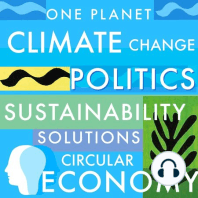20 min listen

SERGEI GURIEV - Economist - Provost of SciencesPo - Co-author of Spin Dictators: The Changing Face of Tyranny in the 21st Century
SERGEI GURIEV - Economist - Provost of SciencesPo - Co-author of Spin Dictators: The Changing Face of Tyranny in the 21st Century
ratings:
Length:
39 minutes
Released:
Jul 4, 2023
Format:
Podcast episode
Description
What is a spin dictator? What does tyranny look like in the 21st century? Why is populism on the rise? And how do we reinvent democracy?Sergei Guriev is the co-author of Spin Dictators: The Changing Face of Tyranny in the 21st Century. Guriev is Provost and a professor of economics and at Sciences Po in Paris. He is a former Chief Economist of the European Bank for Reconstruction and Development, London, and a former Rector of the New Economic School in Moscow in 2004-13."How do we reinvent our democracy? And indeed, the model where you have a representative democracy, then once in four years you vote and delegate, this is a model which is much better than dictators. People criticize Western democracies, but as somebody who lived in a non-democratic country, I will tell you that I'm not surprised that people don't move us to Russia, right? Life is better in a democracy, even if you have criticisms. But there is a major problem here, which is when you vote, do you actually invest in thinking about who you vote for? And the answer to that is most people remain ignorant about the programs of candidates and about the problems of society.And so we need to engage people more in the deliberation of our problems. And indeed, whether digitally or offline, there are now many more experiments and many more ideas on how we can complement representative democracy. Some people even say, 'Replace representative democracy.' But a compliment for me, it's a more complimentary representative democracy with deliberative democracy where we take, for example, what's called a mini public, take a thousand people or maybe 150 people randomly picked, so these are not elites. These are normal people who are randomly picked, who are asked to think about a specific issue, and talk to each other, talk to experts, talk to politicians for several months, and propose a solution. And this is something that has been used a lot now in Western countries. In France, after the Yellow Vest movements, President Macron first launched a great debate at the national level and then created an ecological, social, and economic convention to think about what we can do about climate change in a just way. Because one of the things we faced during the Yellow Vest movement was Macron's promise to impose a fossil fuel tax, which would be good for fighting climate change, but was done in a technocratic way without thinking about people who are left behind. Without thinking about distributional consequences.And so we need to involve everybody in this discussion. And I would say that likely we've now seen that mechanisms experiments like this can work. And of course, digital technology can do even more for this because it's cheaper to launch operations online, and you can involve more people."https://sites.google.com/site/sguriev/https://spindictators.com/www.sciencespo.fr/department-economics/en/researcher/sergei-guriev.htmlwww.creativeprocess.infowww.oneplanetpodcast.orgIG www.instagram.com/creativeprocesspodcast
Released:
Jul 4, 2023
Format:
Podcast episode
Titles in the series (100)
(Highlights) ROB BILOTT: Interviewed by Mia Funk & Dayana Gonzalez · Associate Podcast Producer Dayana Gonzalez by Sustainability, Climate Change, Renewable Energy, Politics, Activism, Biodiversity, Carbon Footprint, Wildlife, Regenerative Agriculture, Circular Economy, Extinction, Net-Zero · One Planet Podcast